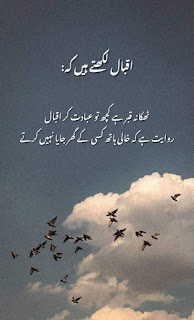Urdu Quotes
Top 10 Beautiful Urdu Quotes for Every Occasion
About The Author
Mohammad Iqbal (1877-1938), a descendant of a Kashmiri Brahmin family that had embraced Islam in the seventeenth century, was born and settled in Sialkot. After a traditional education in Arabic, Persian, and Urdu, he was exposed to a liberal education that defined the contours of his thought and his poetry during the entire period of his life. Beginning his educational career at the Scottish Mission School, he went on to acquire his M. A. In Philosophy, before joining Trinity College, and later earning the degree of Bar-at-Law
He wrote many quotes in Urdu and Farsi Language that build your personality
He worked in different capacities at different points of time; he taught philosophy, practised law, got involved in politics, and also attended the second Round Table Conference.
For centuries people have said: destroy, control, shape, subjugate desire; and society – which after all is only the interaction between individuals – has helped to maintain and sustain the suppression of all feelings. You dare not have strong feelings because if you have a very strong feeling you may do something vital, you may be a dangerous entity, a dangerous citizen. So you begin to suppress, control, shape your feelings to the edicts of society or else you try to sublimate, that is, try to find some way of escaping from the violent tortures of strong feeling. This is what we do, is it not? So, gradually we destroy all feeling except the very, very superficial feelings of a little sex, earning a livelihood for the family, for the very narrow circle, and so on. So our minds, which are petty, reduce all feelings to the same level, and yet without passion – I use that word because, though you may not like it, I think it is the right word – without passion you cannot do anything vital.
The root meaning of the word ‘passion’ is sorrow. We have all had sorrow of some kind or another, losing somebody, the sorrow of self-pity, the sorrow of the human race, both collective and personal. We know what sorrow is. When we remain with that sorrow totally, without trying to rationalise it, without trying to escape from it in any form through words or through action, when you remain with it completely, without any movement of thought, then you will find out of that sorrow comes passion. That passion has the quality of love, and love has no sorrow.
Do you know what it means to love somebody? Do you know what it means to love a tree, or a bird, or a pet animal, so that you take care of it, feed it, cherish it, though it may give you nothing in return though it may not offer you shade, or follow you, or depend on you? Most of us don’t love in that way, we don’t know what that means at all because our love is always hedged about with anxiety, jealousy, fear – which implies that we depend inwardly on another, we want to be loved. We don’t just love and leave it there, but we ask something in return; and in that very asking we become dependent.
So freedom and love go together. Love is not a reaction. If I love you because you love me, that is mere trade, a thing to be bought in the market; it is not love. To love is not to ask anything in return, not even to feel that you are giving something – and it is only such love that can know freedom.
It is good to be alone. To be far away from the world and yet walk its streets is to be alone. To be alone walking up the path beside the rushing, noisy mountain stream full of spring water and melting snows is to be aware of that solitary tree, alone in its beauty. The loneliness of man in the street is the pain of life; he’s never alone, far away, untouched and vulnerable. To be full of knowledge is never to be alone and the activity of that knowledge breeds endless misery. The demand for expression, with its frustrations and pains, is that man who walks the streets; he is never alone. Sorrow is the movement of that loneliness.
Why do you want a friend? Is it because you are lonely? Is it because you depend or rely on them? Is it to have companionship? Is it out of your insufficiency, depending on another to fulfil or to fill that emptiness, and therefore you are using another, exploiting another to cover your insufficiency and utter emptiness, and so call that person a friend? Most of us are lonely, and the older we get, the more lonely. We discover our emptiness, what it means to be lonely, to have no friend at all because you have led a superficial life and depended on others, exploited others, invested your thought, your feelings in another. And when they go away or die you feel so lonely and empty. Out of that emptiness, there is self-pity, and then you again begin the game of seeking somebody to fill that loneliness. Can you see all this and learn from it? Learn what it means to be lonely and not escape from it; look at it, live with it, see what is implied, so that psychologically you depend on nobody. Then only will you know what it means to love.







Comments
Post a Comment